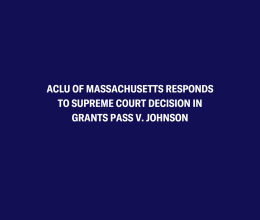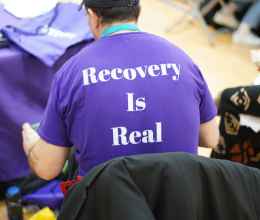More than thirty advocacy and legal services organizations today released the following statement in response to the release of the House criminal justice reform bill and in anticipation of debate next week:
“As organizations that have worked tirelessly to advocate for public health solutions to the opioid crisis and reduce the criminalization of substance use, we are pleased that the legislation released by House Committee on Ways and Means takes some meaningful steps toward sentencing reform. Yet, it falls short of the changes that are needed to address the opioid epidemic and reduce significant racial disparities in sentencing. We urge the House to go further by eliminating all mandatory minimum sentences for drug offenses.
“Advocates and government officials at every level agree that drug use is a public health crisis and therefore requires a public health response. Elected leaders in Massachusetts often say we can’t incarcerate our way out of this problem. Indeed, 40 years of punitive criminal justice policy have done nothing to reduce the availability, potency, or deadly impact of opioids in our families and communities. It’s now time for our leaders to act.
“We can’t afford to miss this opportunity to reorient our justice system to promote public health and improve public safety. Too many lives are on the line. Individuals recently released from prison are 120 times more likely to die of opioid overdoses than the general population. These are our children, siblings, friends, and loved ones.
“Sentencing reform is an essential tool to address the opioid crisis in Massachusetts. People with substance use disorders — including the great multitude of drug users who may participate in illegal activity to maintain their habits — need treatment, not incarceration. A public health response to opioids demands that we end mandatory minimum sentencing for drug offenses, because mandatory minimums deny people incentives to seek and receive the treatment and programming that are necessary to change and save lives.
“While the bill wisely repeals mandatory minimum sentences for some low-level drug offenses, it should go farther by eliminating other mandatory minimums for retail offenses and raising the weights to prosecute a person for drug trafficking. No one should face a rigid mandatory sentence because they possess just 18 grams of heroin or cocaine. That’s the equivalent of 4½ packets of sugar, an amount a person with a serious substance use disorder could use in just a few days.
“Troublingly, the bill would set an even lower weight (10 grams) for trafficking of fentanyl, which simply does not make sense. Fentanyl is almost never sold by itself; it is mixed with heroin. This change will mean that people in possession of small quantities of heroin – drug users suffering from opioid use disorder – are going to be prosecuted as fentanyl traffickers.
“Over the last three decades, incarceration has risen at a faster rate in Massachusetts than in the nation overall. Tough on crime policies have driven incarceration rates up to exceptionally high levels in communities of color. And instead of reducing overdose deaths, the ‘war on drugs’ has only exacerbated the opioid crisis across the Commonwealth.
“Massachusetts policymakers must seize this opportunity to align word and deed, rhetoric and policy. They should not let down their constituents who are counting on them to pass serious sentencing reforms to address the opioid crisis.”
ORGANIZATIONS:
- ACLU of Massachusetts
- Brookline PAX
- Charles Hamilton Houston Institute for Race and Justice
- Citizens for Juvenile Justice
- Coalition for Effective Public Safety
- Coalition for Social Justice
- Committee for Public Counsel Services
- Criminal Justice Policy Coalition
- End Mass Incarceration Together (a Task Force of UU Mass Action)
- Ex-Prisoners and Prisoners Organizing for Community Advancement
- Fair Punishment Project
- Greater Boston Interfaith Organization
- Greater Boston Legal Services CORI & Re-entry Project
- Jewish Alliance for Law and Social Action
- Jobs Not Jails
- League of Women Voters of Massachusetts
- The Lionheart Foundation
- Mass Incarceration Working Group of the First Parish Unitarian Universalist of Arlington
- Massachusetts Association of Criminal Defense Lawyers
- Massachusetts Communities Action Network Massachusetts CURE Inc.
- Massachusetts Law Reform Institute
- Massachusetts Organization for Addiction Recovery
- NAACP, New England Area Conference, representing the following branches: NAACP, Amherst Branch NAACP, Berkshire County Branch NAACP, Boston Branch NAACP, Brockton Branch NAACP, Cambridge Branch NAACP, Cape Cod Branch NAACP, Martha’s Vineyard Branch NAACP, Mystic Valley Area Branch NAACP, Merrimack Valley Branch NAACP, New Bedford Branch NAACP, South Middlesex Branch NAACP, Springfield Branch NAACP
- Worcester Branch National Association of Social Workers
- MA Branch Prisoners’ Legal Services
- Progressive Democrats of Massachusetts
- Progressive Massachusetts
- Project Operation Change
- ROCA
- SOLO Project
- #StuckOnReplay
- The Real Cost of Prisons Project
- Women's International League for Peace and Freedom




